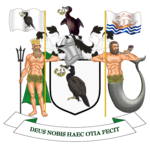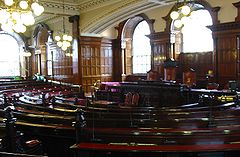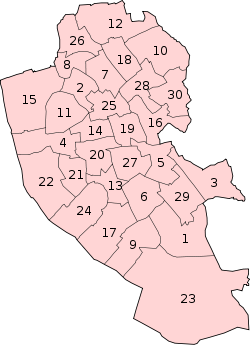- Liverpool City Council
-
Liverpool City Council


Type Type Metropolitan district council of Liverpool Leadership Leader Joe Anderson Members 90 Elections Last election 6 May 2010 Meeting place 
Liverpool Town Hall
L2 2DH
Dale Street
Liverpool
MerseysideWebsite http://www.liverpool.gov.uk Liverpool City Council is the governing body for the city of Liverpool in Merseyside, England. It consists of 90 councillors, three for each of the city's 30 wards. The council is currently controlled by the Labour Party and is led by Joe Anderson.
Contents
History
Domain
Liverpool has been a town since 1207, when it was granted its first charter by King John. It has had a town corporation (the 'Corporation of Liverpool) since before the 19th century, and this was one of the corporations reformed by the Municipal Corporations Act 1835. The corporation created a police force in 1836.
Liverpool was granted city status in 1880. When local government was reformed in 1888 under the Local Government Act 1888 it was one of the cities to become a county borough, and thus independent of Lancashire. This situation persisted until 1974 with the Local Government Act 1972, when due to urban expansion and the accretion of a large metropolitan area, the city was made a metropolitan district of the metropolitan county of Merseyside. This saw the old corporation nomenclature abolished and the council reconstituted as Liverpool City Council.
In 1835 Liverpool expanded into the village of Everton and then the township of Kirkdale in the 1860s. In 1895 Wavertree, Walton and parts of Toxteth and West Derby were incorporated into the city. Fazakerley (1904) and Gateacre (1913) followed, then the rest of West Derby known as West Derby Rural in 1928 and finally Speke in 1932.
In 1986 the council of Merseyside was abolished and its functions devolved to its districts, but the county still legally exists. It should be noted therefore that Liverpool has never been a district council under Lancashire County Council.
Administration
In the late 1970s the City was run by the Liberal Party under Sir Trevor Jones. As part of their plans, a cost cutting exercise was drawn up, to reduce the council's costs by 25%. In 1979 the Conservative Party won the General Election. The new government intended to cut council spending but Liverpool City Council successfully negotiated an exception from this, on the grounds that they were already following government policy and cutting 25%.
During the 1980s, the Militant movement gained control of several Labour councils including Liverpool, and challenged the national government on several issues including refusing to set a budget in 1985. The council then adopted a 'deficit budget' in which spending exceeded income, and causing a financial crisis. The leadership of the Labour Party was drawn into the controversy, culminating with Neil Kinnock's noted speech to Conference in 1985, denouncing Liverpool City Council without explicitly naming it. Derek Hatton, Councillor for Netherley ward and Deputy Leader of the Council, and Eric Heffer, MP for Liverpool Walton constituency, staged a walk-out. Liverpool Labour Party ultimately attempted to expel members of the Militant tendency.
Further recent events:
- 1998 The Liberal Democrats win control of Liverpool City Council.
- 2003 Liverpool win the UK nomination of European Capital of Culture for 2008.
- 2004 Liverpool's waterfront and parts of the city centre are given World Heritage status.
- 2005 In November Lib Dem leader of the Council Mike Storey resigns after eight years following emails in which he was accused of plotting to try to engineer the departure of the Council's Chief Executive, Sir David Henshaw, who had already announced his intention to retire.
- 2005 Cllr Storey was replaced as leader by Warren Bradley. Sir David Henshaw was replaced as chief executive by Colin Hilton.
- 2006 Planning decisions and policies of the Council threaten the World Heritage status. Council faces cutting £29million from its budget - much of it from the money earmarked for Capital of Culture.
- 2007 Mathew Street festival - large free outdoor festival, controversially cancelled at last minute due to health and safety concerns
- 2008 Council awarded 1 star by Audit Commission and as such the worst performing council in the country.
- 2008 Jason Harborow, Chief Executive of Culture Company, charged with delivering Capital of Culture, quits with a large cash payout after clashes with Cllr Warren Bradley and Cllr Mike Storey.
- 2008 Liberal Democrats lose overall control of city on 1 May in local elections, however a midnight defection of an Independent (Former Labour) Councillor gives them a majority of 1.
- 2008 Green Party take second seat in St Michael's ward, becoming a recognisable "group" on the council.
- 2009 The council announces a major shake up of middle management.[1]
- 2010 The Labour party win control of the council for the first time in 12 years, with Joe Anderson becoming the new council leader[2]
- 2011 The Labour Party's Jake Morrison aged 18 defeats Lord Mike Storey after 38 years service[3]
The Lord Mayor
The Lord Mayor of Liverpool is the first citizen and chosen representative of the city, acting as a focal point for the community as well as promoting the city. The Lord Mayor's main responsibilities includes meeting delegates from twinned cities, chairing council meetings and representing the city. The Lord Mayor of Liverpool is always a serving councillor, elected by the full council at its Annual General Meeting held each May, and serve for a term of one year: the current Lord Mayor is Councillor Frank Prendergast.
A list of past Lord Mayors of Liverpool can be found here
Council Wards
Liverpool is split into 30 separate wards for elections.[4]
Political makeup
Elections are usually by thirds, in three of every four years. 2004 saw new boundaries and a reduction in the number of councillors from 99 to 90, so all seats were contested.
In March 2007, Labour gained a seat from the Liberal Democrats in a by-election in Speke Garston ward. In the May 2007 council elections, the Liberal Democrats lost 4 seats to Labour, leaving the council make-up as Liberal Democrats 51, Labour 35, Liberals 3 and Greens 1.
Labour then won a second by-election in Warbreck ward in September 2007.
In May 2010, the Labour Party, led by Joe Anderson, gained control of the council for the first time in 12 years.[5] In May 2011, Labour increased their majority on the Council making 11 gains.
Year Labour Lib Dems Liberal Green Others 2011 62 22 3 2 1 2010 51 33 3 2 1 2008 39 46 3 2 0 2007 43 53 3 1 0 2006 30 57 3 0 - 2004 27 60 3 0 - 2003 31 63 3 0 2 Council Control
See also: Liverpool City Council electionsIn the 19th and early 20th Century the council was run by the Tories, whose policies were responsible for Liverpool leading the way in many areas of social reform, for example the provision of the first council-housing in Europe. Liverpool was one of the last cities in the UK in which the Labour Party gained control, this not occurring until 1955.
The council has switched numerous times between Liberal Democrats control and Labour control since its reconstitution in 1974, with two periods of no overall control.[6]
- 1890: Archibald Salvidge
- 1929: Thomas White
- 1938: Alfred Shennan
- 1955: Jack Braddock
- 1961: Maxwell Entwistle
- 1963: Jack Braddock
- 1964: Bill Sefton
Controlling party Years Leader No overall control 1974–1983 1974 – 1975 Cyril Carr (Liberal)
1975 – 1976: Bill Smyth (Liberal)
1976 – 1978: John Hamilton (Labour)
1978 (May – June): Eddie Roderick (Labour)
1979 – 1983: Trevor Jones (Liberal)Labour 1983 – 1987 1983 – 1986: John Hamilton
1986 – 1987: Tony ByrneLiberal 1987 (March – May) Trevor Jones Labour 1987 – 1992 1987 (May – October): Harry Rimmer
1987 – 1990: Keva Coombes
1990 – 1992: Harry RimmerNo overall control 1992 – 1996 Harry Rimmer (Labour) Labour 1996 – 1998 Frank Prendergast Liberal Democrat 1998 – 2010 1998 – 2005: Mike Storey
2005 – 2010: Warren BradleyLabour 2010 – present 2010 – present Joe Anderson Sites
- Municipal Buildings, Liverpool Admin Centre.
- Liverpool Town Hall Ceremonial HQ.
- Calderstones House Recreation and Open Spaces Departments.
References
- ^ Waddington, Marc (January 30, 2009). "Liverpool Council: We’ll cut back on big money". Liverpool Echo. http://www.liverpoolecho.co.uk/liverpool-news/local-news/2009/01/30/liverpool-council-we-ll-cut-back-on-big-money-100252-22815218/. Retrieved January 30, 2009.
- ^ "Labour sweeps to power in Liverpool after 12 years of Lib Dem rule". Liverpool Echo. http://www.liverpoolecho.co.uk/liverpool-news/local-news/2010/05/07/labour-sweeps-to-power-in-liverpool-after-12-years-of-lib-dem-rule-100252-26400432/. Retrieved 7 May 2010.
- ^ "Teenage Labour candidate beats ex-Lib Dem Leader". BBC Newsaccessdate=6 May 2011. 6 May 2011. http://www.bbc.co.uk/news/uk-england-merseyside-13275291.
- ^ http://www.liverpool.gov.uk/Business/Economic_development/Key_Statistics_and_Data/Ward_profiles/index.asp
- ^ "Labour win Liverpool Council for first time in 12 years". BBC News. 7 May 2010. http://news.bbc.co.uk/1/hi/uk_politics/election_2010/england/8668630.stm. Retrieved 7 May 2010.
- ^ "BBC NEWS, Election 2006, Liverpool". BBC News. http://news.bbc.co.uk/1/shared/vote2007/councils/html/by.stm. Retrieved 2010-05-11.
External links
- Liverpool City Council
- Ward profile
- Capital of Culture 2008
- Liberal Democrats in Liverpool
- The Labour party in Liverpool
- The Liberal Party in Liverpool
- The Green Party in Liverpool
Liverpool Architecture (Listed buildings · Tallest buildings) · Companies · Council · Culture (Music) · Demographics · Dialect · Districts · Economy · Education (Schools) · Elections · Fire · Health (Ambulance · Hospitals) · History · Landmarks (Maritime Mercantile City) · Mayor · Media (Film and Television) · Parks · People · Police (Air Support Group · Port · Tunnels) · Port (Docks) · Religion (Archbishop · Bishop) · Retail · Sport · Transportation · WardsCeremonial county of Merseyside Metropolitan districts Major settlements Bebington • Birkenhead • Bootle • Crosby • Formby • Heswall • Hoylake • Kirkby • Liverpool • Maghull • Moreton • New Ferry • Newton-le-Willows • Prescot • Southport • St Helens • Wallasey • West Kirby
See also: List of civil parishes in MerseysideRivers Topics Categories:- Liverpool City Council
- Metropolitan district councils of England
Wikimedia Foundation. 2010.


